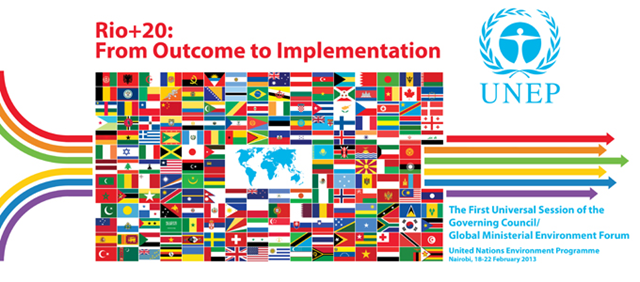UN widens effort to fix environmental woes – ‘It is becoming more and more clear in the minds of the public that climate change is a clear and present danger that will require us to act’
18 February 2013 (Reuters) – A new United Nations plan to involve all nations in marshalling science to fix environmental problems ranging from toxic chemicals to climate change will be put to the test from Monday at talks in Nairobi. The 40-year-old U.N. Environment Programme will open its annual governing council to all the world’s almost 200 nations, up from a current group of 58, under reforms aimed at making the world economy greener at a time of weak economic growth. “A strengthened UNEP will … improve and enhance international cooperation on the environment,” Achim Steiner, executive director of UNEP, said of the annual Feb. 18-22 meeting in a telephone interview with Reuters. Environment ministers or senior officials from about 150 nations are due to attend, out of almost 200 possible worldwide. Until now, UNEP’s governing council has left out many smaller states, from Guyana to Albania. The shift is meant to sharpen world focus on problems such as toxic chemicals, over-fishing and global warming. Getting more countries in the room will not necessarily make reaching agreements easier but should give UNEP decisions more authority. […] UNEP has registered some successes, such as the 1987 Montreal Protocol for limiting emissions of gases blamed for thinning the planet’s protective ozone layer, or a treaty due to be signed in Japan this October to limit toxic mercury. Climate change has proved far tougher to solve as global emissions of greenhouse gases have continued to rise. China, the United States and the European Union are top emitters. Governments aim to work out a deal by the end of 2015 to slow global warming and make it effective from the end of 2020. World leaders including U.S. President Barack Obama failed to nail down a treaty at a summit in Copenhagen in 2009. “On the current trajectory of negotiations it is not easy to see how by 2015 a new framework agreement will emerge,” Steiner said. But some nations have been acting on their own and extreme events, such as a melt of the Arctic sea ice, droughts, floods, and powerful storms, have underscored the risks. “It is becoming more and more clear in the minds of the public that climate change is … a clear and present danger that will require us to act,” he said. [more]
UN widens effort to fix environmental woes

"The 40-year-old U.N. Environment Programme"…
They've had 40 years to provide leadership, and the world is in far worse condition then when they started.
No hope here.
World bodies do not work. World government does not work. This should be obvious.
Solving the basic needs of food, shelter and economics by country is the only answer I can think of. Don't see how though. It always comes down to using resources, and that means depletion / destruction.
Dramatically lowering population levels would help immensely.